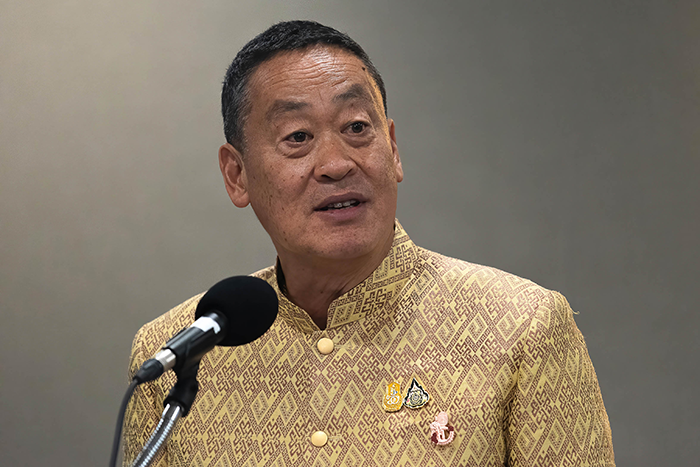Interviews / Asia-Pacific
12 June 2024
Thailand: Political Deadlock and Multiple Challenges

Despite the hope embodied by the May 2023 general elections, Thailand’s political deadlock continues, with the shadow of authoritarianism and the military—who seized power by force in 2014—still looming large. While the country remains economically weakened since the Covid-19 pandemic, with the tourism sector having been particularly hard hit, Thailand also faces numerous social and demographic challenges. On the diplomatic front, Bangkok continues to pursue a balancing act by maintaining good relations with Western countries, notably France and the United States, while taking care not to antagonise Beijing. What can be said of Thailand’s current economic and social situation? What foreign policy direction is Bangkok pursuing? Analysis by Barthélémy Courmont, Research Director in charge of the Asia-Pacific Programme at IRIS.
The return of former Prime Minister Thaksin Shinawatra (2001–2006) and the formation of a new government last autumn—how can Thailand’s political situation be interpreted?
The situation is rather unclear—and worrying in that it does not reflect the aspirations of the Thai people. It is worth briefly recalling the facts. Following the May 2023 election, which was expected to mark a turning point after several years of military government (since the 2014 coup), the young Move Forward Party came first, ahead of Thaksin’s Pheu Thai Party, while the conservatives and military parties trailed far behind. The two leading parties agreed on the need to return to democracy and notably pledged to amend the lèse-majesté law, a tool used by the military to suppress dissenting voices. However, the coalition formed by the two parties failed to form a government around the young Move Forward leader, Pita Limjaroenrat, despite holding a comfortable majority. This was due to the Senate’s refusal to endorse the appointment of a Prime Minister who had campaigned against conservatives and the military and who promised to demilitarise Thai political life. The Senate’s members have been appointed by the military since 2014. Despite several appeals, a government was formed in August 2023 around Pheu Thai and Srettha Thavisin, who became Prime Minister thanks to a break with his electoral ally. For nearly a year now, therefore, the Thai people have been ruled by a government they did not choose—merely prolonging the political stalemate and authoritarian drift that have gripped the country for the past decade. Meanwhile, Thaksin returned to the country and, after serving a symbolic prison sentence, has once again become one of the most influential figures in Thailand. Politically, then, Thailand remains a major concern and has been unable to break free from the cycle triggered by the 2014 coup (which itself stemmed from deeper issues).
What economic and social challenges does Thailand face?
While Thailand has, for nearly a century, been caught in a cycle of repeated coups, these have paradoxically helped ensure a form of stability in a country that has never been colonised and was once one of the driving forces of the Southeast Asian economy—thanks to substantial Western investment in the 1960s and 1970s, followed by significant Japanese and later South Korean presence. Although the country suffered greatly from the 1997 Asian financial crisis, it remained one of ASEAN’s economic engines alongside Singapore and Indonesia. However, the trend of the past two decades is cause for concern, as Thailand has struggled to establish itself as a model within ASEAN. Added to this are the consequences of the Covid-19 pandemic, which were particularly severe in a country where over 20% of GDP depends on tourism, notably from China. While tourism is now rebounding significantly, raising hopes of long-awaited economic improvement, one only has to visit traditionally popular destinations for Chinese tourists—such as the Chiang Mai region in the north—to see just how sluggish the recovery still is. Though not the “sick man” of ASEAN—Burma’s situation is far more tragic—Thailand now faces numerous economic and social challenges. It should be noted that the country is also experiencing a demographic decline that may accelerate over the coming decades, with its current population of 70 million potentially falling to 50 or even 40 million by the end of the century. Another immense challenge thus awaits future generations of Thais. A final word must also be said about migration: the country is currently facing an influx of refugees from war-torn Myanmar—officially a few hundred thousand, but estimated between three and four million according to various sources.
How has Thai foreign policy evolved in recent years? What are Bangkok’s priorities and strategic partners?
Bangkok maintains a foreign policy that enables it to stay close to both Western democracies and China, despite growing tensions between Beijing and Washington. In this regard, Thailand’s position is similar to that of other ASEAN countries (with the exception, for now, of the Philippines under Ferdinand Marcos Jr.) and avoids submitting to any one major power. Despite leading an authoritarian government, former Prime Minister and General Prayut Chan-o-cha (2014–2023) succeeded in maintaining close relations with Western countries—he was, for instance, received twice at the Élysée Palace by Emmanuel Macron. At the same time, Thailand enjoys very close ties with Beijing (around 14% of the population is of Chinese origin, as is common in other countries in the region with large Chinese diasporas), and maintains strong economic and commercial relations with China, while refraining from openly opposing Beijing’s ambitions, particularly in the South China Sea. Thailand nonetheless consistently emphasises its sovereignty, including when negotiating agreements with Beijing under the Belt and Road Initiative. The goal is to avoid antagonising major powers without becoming overly dependent on them. This balancing act can at times be difficult, especially in the face of economic and political challenges, but Bangkok continues to manage it with a certain degree of skill.

